OBJECTIVE: The aim of the study was to assess the effect of different types of anaesthesia on pain intensity in early postoperative period. METHODS: A total of 87 patients (77 women, 10 men) scheduled for total knee arthroplasty (TKA) were assigned to receive either subarachnoid anaesthesia alone or in combination with local soft tissue anaesthesia, local soft tissue anaesthesia and femoral nerve block and pre-emptive infiltration together with local soft tissue anaesthesia. We assessed the pain intensity, opioid consumption, knee joint mobility, and complications of surgery. RESULTS: Subjects with pre-emptive infiltration and local soft tissue anaesthesia had lower pain intensity on the first postoperative day compared to those with soft tissue anaesthesia and femoral nerve block (P=0.012, effect size 0.68). Subjects who received pre-emptive infiltration and local soft-tissue anaesthesia had the greatest range of motion in the operated knee at discharge (mean 90 grades [SD 7], P=0.01 compared to those who received subarachnoid anaesthesia alone, and P=0.001 compared to those with subarachnoid together with soft tissue anaesthesia). CONCLUSION: Despite the differences in postoperative pain and knee mobility, the results obtained throughout the postoperative period do not enable us to favour neither local nor regional infiltration anaesthesia in TKA. Level of Evidence II, Prospective Comparative Study.
Arthroplasty, replacement, knee; Anesthesia; Anesthesia, local; Nerve block; Femoral nerve


